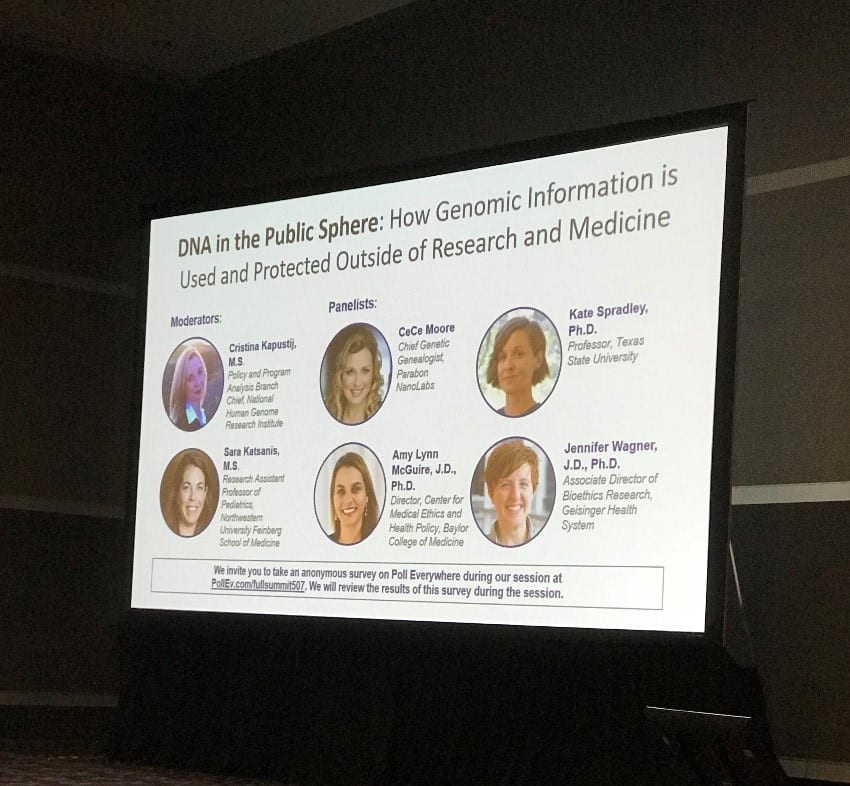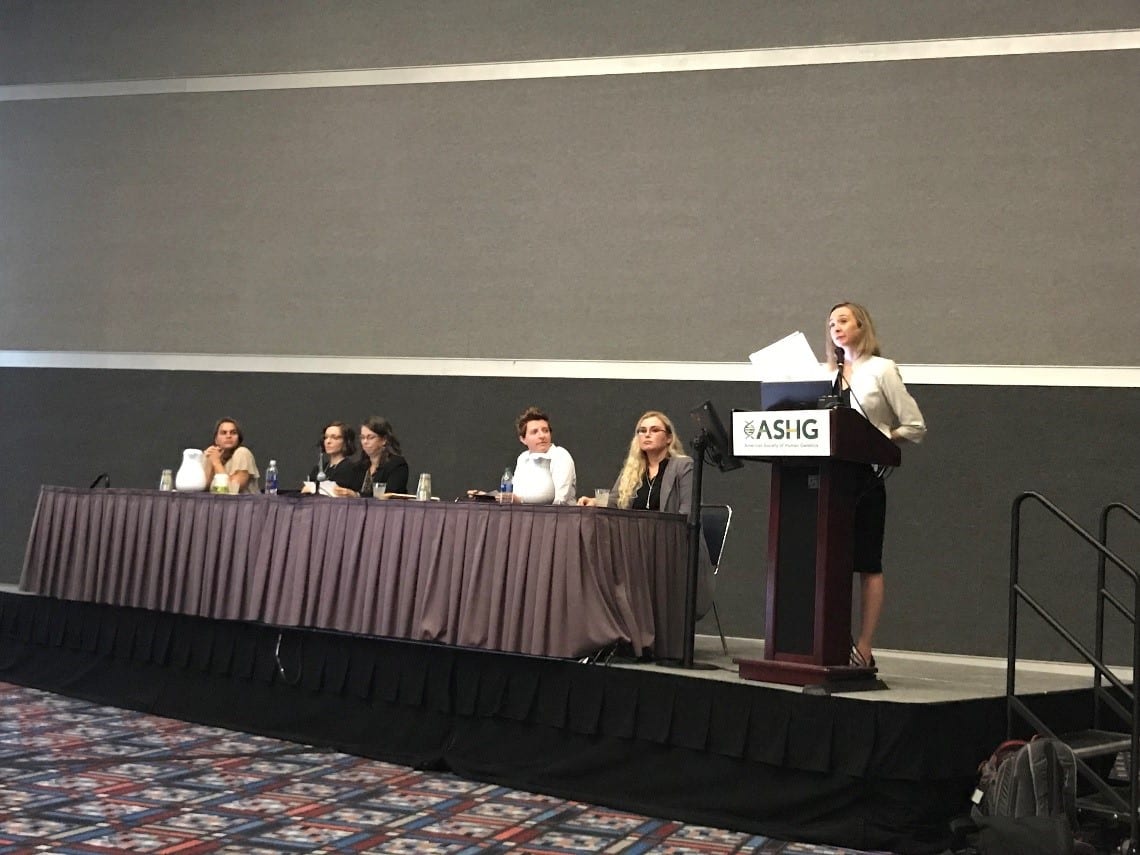Posted By: Eve Granatosky, PhD, and Sammy Katta, PhD, Genetics and Public Policy Fellows
In addition to showcasing a wide array of excellent scientific programming, the ASHG 2019 Annual Meeting featured several interesting discussions on topics at the intersection of science, policy, and bioethics.

One such session was “DNA in the Public Sphere: How Genomic Information is Used and Protected Outside of Research and Medicine,” which brought together experts in genealogy, anthropology, forensics, and law to discuss how genetic information is integrated into their work. The session included:
- CeCe Moore, DNA Detectives and Parabon Nanolabs
- Amy McGuire, JD, PhD, Baylor College of Medicine
- Kate Spradley, PhD, Texas State University
- Jennifer Wagner, JD, PhD, Geisinger Health
- Cristina Kapustij, MS, National Human Genome Research Institute (co-moderator)
- Sara Katsanis, MS, Northwestern University (co-moderator)
Behind the Scenes
Eve had an inside look into the makings of this session during her Genetics and Public Policy Fellowship rotation in the Policy and Program Analysis Branch (PPAB) at NHGRI (read more about her fellowship experiences). She worked with PPAB Branch Chief Cristina Kapustij to shape the overall scope of the session, brainstorm and invite potential panelists, and draft the proposal for the session. She had a great learning experience considering which speakers would be interesting to ASHG attendees and how their different expertise and perspectives would contribute to the discussion.
Engaging with Attendees
CeCe Moore opened the discussion by outlining facts and myths about her work as an investigative genetic genealogist, and expressed concerns that changes in public databases’ policies requiring users to opt in to searches will make it more difficult to both accurately identify likely suspects and avoid unfairly targeting innocent, uninvolved persons. Amy McGuire spoke about how general mistrust of government shapes perceptions of using genetic databases, and noted that current policy provides no oversight for bad actors and violations of public trust. Kate Spradley discussed the challenges of identifying postmortem human remains found near the border given their varied nationalities, and emphasized that international collaboration and transnational agreements on the use of genetic data would be immensely helpful to her work. Jennifer Wagner concluded by walking the audience through legal precedents surrounding the use of DNA outside of research, and emphasized the lengthy process involved in enacting new regulations or law.
In a live poll during the session, about 200 attendees shared their interests, reactions to the topics presented, and ideas for continued conversation related to regulation, privacy, security, and engagement.
- 48% had heard from the media about DNA databases being used in criminal investigations. Despite the prevalence of immigration-related stories in the national news, only 2% of respondents had heard that DNA data is used in this context.
- 28% of respondents said that they would add their raw genomic data to a public database knowing that it might be used by law enforcement. 42% said they would not add their data, and the remaining 30% were unsure.
- 59% of respondents either felt positively or somewhat positively about the creation of a universal DNA database for solving crimes and investigating deaths, while 33% felt negatively and 8% were unsure.
- 45% of respondents said that DNA testing should not be used on migrant families to verify claimed relationships, while 28% believed that it should be used and 27% were unsure.

Session attendees also commented on how the genetics community should connect with the public on the use of genetics in the public sphere. Top answers were:
- Being clear and open about how DTC companies can use genetic information
- Maintaining transparency in how DNA can be used in all facets of society and encouraging the public to be engaged with enforcing this transparency
- Hosting and participating in conversations with non-scientists in community spaces
- Developing guiding principles for the use of DNA outside of research and medicine
Earlier this fall, ASHG released a perspective describing the society’s core principles about privacy protections that should apply to all genetics and genomics research. Many of the themes in ASHG’s perspective also arose during this session. Attendees generally agreed about the importance of considering the context and potential benefits and risk of the use of genetic data, and that transparency, confidentiality, and individual decision-making about data use should be prioritized in all contexts.
Continuing the Conversation
Sammy, who recently began her first fellowship rotation at PPAB, found the panel to be a fascinating introduction to some of the less-publicized policy implications of genetic testing. She will be sharing the panelists’ perspectives and the audience’s responses with the NHGRI community through a poster at the institute’s upcoming annual symposium. She hopes attendees at the session and the symposium will feel more informed about these policy issues, and encourages them to continue discussing with their communities how DNA is used in the public sphere.
Eve Granatosky, PhD, is the 2018-2019 Genetics and Public Policy Fellow, and is currently completing her third fellowship rotation in ASHG’s Policy and Advocacy Department. Sammy Katta, PhD, is the 2019-2020 Genetics and Public Policy Fellow, and is completing her first fellowship rotation at NHGRI.
